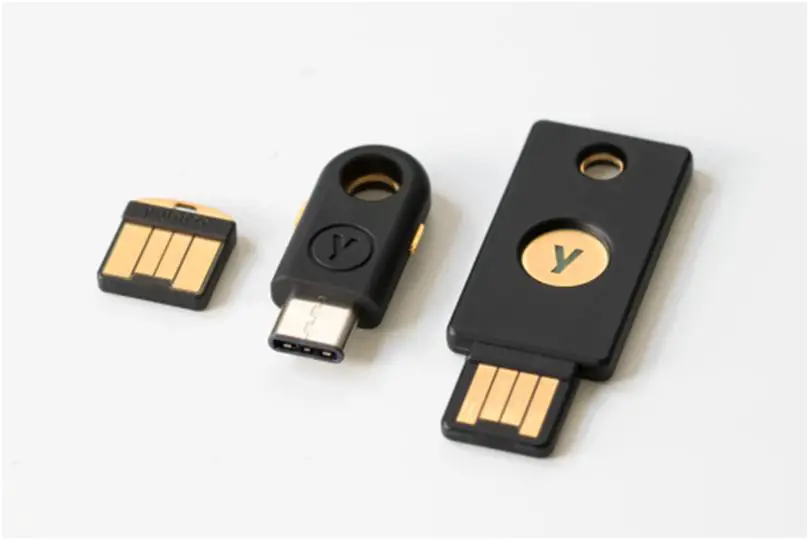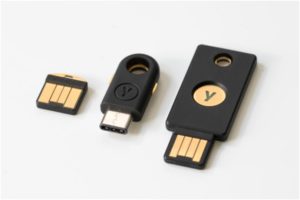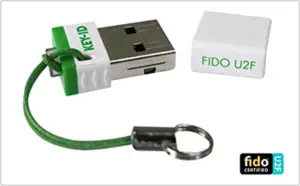When it comes to increasing online security, there are a multitude of questions you may have, and understandably so. This is why we are reviewing Yubikey vs. FIDO and compare them to see the better pick.
If you are reading this article, it is likely because you have many questions about your online security – and you are not alone in your concerns. In fact, statistics continually show that passwords are generally becoming weaker forms of security as time goes on – such as a recent article that highlighted the issue.
However, there is some hope. It all began with 2FA, while the other form of protection is through U2F security keys, which are unique keys that are shaped like USB drives and do not require you to use your password.
What are the differences between Yubikeyvs.FIDO? How do they compare?
| Key model | Yubikey | FIDO |
| Dimensions | 2.6 x 1.6 x 0.2 | 0.9 x 0.6 x 0.3 |
| Protocols | Multi-protocol | Multi-protocol |
| Compatibility | Multiple internet platforms | Chrome and browsers that are FIDO-compliant (except Linux) |
| Check here | Check here |
Yubikey vs. FIDO – what are the differences?
The spread of the internet has led to great advantages – you can store your data, and not have to worry about losing it. All seems well, until you notice one day that suddenly, you cannot access your data anymore – all because your account was breached after someone hacked your password.
In situations like these, it is easy to panic because of the possibility of losing your information or it being used for negative purposes; but you can prevent that from happening by prioritizing your online security. These two keys work well to maximize your security. Here are some of those differences.
Key variety
At first glance, both the Yubikey and FIDO may not have stark differences between them, as they are both U2F security keys. However, the most noticeable feature would be the variety of keys you can get in the Yubikey – totaling up to five. They include Yubikey 5 NFC, 5C, 5 Nano and Security key NFC. On the other hand, the FIDO does not have an extensive selection, although it is great for those on a budget.
Protocols and compatible browsers
The Yubikey is good at working with numerous protocols and platforms, such as through their tap-and-go authentication with Windows 10 devices and Android applications. You only need to register, a very easy process, then tap the key to authenticate your account.
The FIDO also works well from Chrome, as long as you use Windows or Mac. This is also aided by the availability of open source software, which developers can use it other browsers and OS systems. It does not work for Linux though, which is disappointing to say the least.
Security mechanism
In the FIDO key, both the software and hardware are open source, and, they allow for independent reviews regarding their security. That means you do not get cases of hidden issues with the security of your data, and there is also no vendor lock-ins or obfuscation. You can also carry it around, as it has a useful key ring loop.
However, the Yubikey only allows you to access your account, rather than the typical password system that risks hacking (unless you use a two-factor authentication system as a backup).
Yubikey
Note that that the key includes USB for the desktop experience and NFC for the mobile users, making it easy for you to use it regardless of the device you prefer. The main information that regards the use and any other questions you may have is on the main Yubico website, and you will get everything you need from there as well as the applications it works well with.
Pros
- Very easy to set up and use
- It secures all your information on the internet
Cons
- You will require some extra steps when setting it up, which is a slow process
FIDO security key
If you are on a budget and looking for some added protection, the FIDO security key will work for you. Its setup is generally very easy – in fact, after the setup process, all you need is a connection to your computer, then a secure form of authentication is created between the device and your computer.
Pros
- Effective at securing accounts, and easy to use
- Affordable
Cons
- Does not have Linux support
Final thoughts
When examining the Yubikey vs. FIDO security keys, Yubikey comes out on top because of several reasons. While it may be more challenging to set up compared to the FIDO, it still retains an advantage because of the support it has from all OS, unlike FIDO that does not work with Linux. At the end of the day, they are great for starters in the online security sector, and will protect your account very well.
FAQs
What is the advantage of using U2F keys over 2FA authentication methods?
While 2FA proves be to a more useful security method than a password, it does have its own inherent issues. U2F is the most reliable, as it allows you to access multiple accounts without the need of a password or exposure risks, all through the use of one device.
On the other hand, is there an advantage of using U2F keys like Yubikey?
U2F is the most reliable mode of accessing your online accounts safely, as it allows you to enter multiple accounts without the need of a password or exposure risks, all through the use of one device.
How do you use both?
The use of the U2F key is not as difficult as it may seem on the surface, regardless of whether you deal in Yubikey or Nitrokey Pro. The key will basically work as a second factor authentication.
Additionally, when it comes to the wallet, simply plug in the device to an internet-enabled device or computer, and enter your PIN and confirm your transactions.
What if they get stolen?
The person who steals the key or wallet cannot access your account unless they know your password, which they do not store.
Do you need a separate key for each account?
No, you can use one key for multiple accounts, just like the 2FA system that allows you to use one app for multiple accounts, but different codes. This is because the key stores your digital information in a chip.



